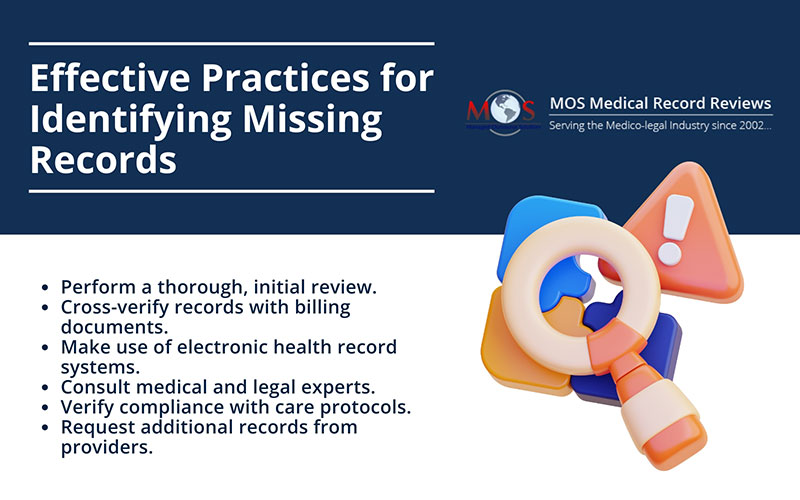Incomplete medical records can pose a considerable challenge during medical record review for healthcare and legal purposes. Promptly identifying missing medical records can be the cornerstone of clarity and accountability, regardless of whether it is a malpractice claim, or an insurance settlement.
This post will explore the importance of complete and accurate medical records, the legal implications of incomplete records and why healthcare/legal professionals rely on expert providers of medical review solutions like Managed Outsource Solutions (MOS).
The Significance of Complete Medical Records
Comprehensive medical records are indispensable in the healthcare sector, as they provide a detailed map of a patient’s health journey, ensuring their care and safety.
- Insights into Patient Experience: Incomplete records often lead to wrong treatment procedures, irrelevant lab tests or missed diagnoses, all of which can endanger a patient’s health outcome. For example, a missing medical history of a patient in his/her chart could lead to the prescription of a contraindicated drug, which could result in serious health complications.
- Medical Billing/Insurance Errors: A recent study revealed that over 10% of claim denials or disputes in billing are as a direct result of documentation gaps. This creates financial stress for patients and providers alike. However, this issue can be addressed by identifying missing records early, which ensures adequate patient care and financial integrity.
- Clinical Research & Accountability: Medical records are a crucial aspect in clinical research, quality improvement and affirming the practitioner’s accountability. When these medical records are incomplete, a major gap in patient care or areas needing improvement might go unnoticed.
The Legal Implications of Missing Medical Records
- Medical Malpractice Claims
Medical records serve as vital evidence in a malpractice case, and missing records can weaken the case as the timeline of events would be obscured, complicating the defendant’s chances of proving standard care of adherence.
- For Plaintiffs: In cases of alleged negligence, missing records can further compound the issue by handing undervalued settlements or worse, the case getting dismissed. For example, missing surgical notes can lead to not proving the causation of postoperative infection from improper sterilization.
- For Defendants: It would be a difficult task for healthcare providers accused of negligence, to defend themselves with incomplete medical records in hand, which could expose them to unwarranted liabilities.
- Criminal Cases
In certain cases, such as insurance malpractice or abuse allegations, missing records can impede justice. These records could contain crucial evidence of timeline, events, injuries occurred or any other conditions relevant to the case which could either delay or even derail the entire case.
- Legal and Regulatory Compliance
Missing/incomplete medical records result in direct violation of HIPAA or GDPR (Europe) and other privacy rights. Healthcare facilities will risk facing lawsuits, penalties and reputational damage as a result of something as basic as maintaining proper medical records.
Challenges in Identifying Missing Medical Records
Promptly identifying missing medical records can be a daunting task, especially sifting through vast amounts of documents and cases with multiple providers/long medical history.
- Fragmented Record System: Healthcare record-keeping is still not completely streamlined, with information often spread across Electronic Health Records (EHR), paper documents and imaging systems. The lack of a centralized system can lead to missing/incomplete documentation.
- Complexity of Medical Records: The sheer volume and the medical content could be intimidating to an untrained eye. Modern healthcare often generates vast amounts of data and analyzing it is a tough task. For example, a patient undergoing long-term diabetic treatment could have large volumes of medical data, across multiple providers.
- Lack of Expertise: It is difficult for an attorney or an insurance professional to analyze medical records and spot inconsistencies/missing records, as they lack the medical expertise required. They often will have to hire an in-house team which could be even more difficult to manage and could further complicate the existing workflow.
Best Practices to Identify Missing Medical Records
Identifying missing medical records is paramount in building a strong case.
Below are some practices that could help identify missing records:

- Comprehensive Review: Thoroughly analyze every document, ensuring completeness.
- Review patient history (pre-existing conditions, medications, allergies, past surgeries).
- Make sure records from all providers (physicians, lab centres etc.) are included.
- Look out for unaccounted treatment periods or timeline gaps.
- Cross Check with Billing Records:
- Review and look for any gaps between billed procedures and delivered care.
- Do a thorough investigation on unaccountable charges for potential missing documents.
- Utilize EHR Systems:
- EHRs can track and review communications between providers for completeness.
- EHRs can pinpoint discrepancies—spot missing test results, physician notes or medical prescriptions.
- Effective Communication with Providers:
- Submit requests for documents you think should be there such as discharge summaries, diagnostic reports and physician notes. Sometimes, it is common for providers to miss documents, unintentionally.
- Submit requests for audit trails to see who has accessed or modified records. EHRs usually maintain these records.
- Consult Professional Experts:
- Expert, third-party review agencies offer well-structured processes to identify & flag inconsistencies/gaps.
- MOS Medical Record Retrieval Services provides comprehensive summaries and verifies all documents ensuring completeness.
Whether legal or medical cases, incomplete medical records are not just a temporary disruption-they’re more of a lasting liability. They can impede the truth, obscure patient care, and eventually lead to legal battles that could drain your financial and human resources. By swiftly identifying and addressing missing records, you can ensure accuracy, accountability, and justice.
When on clutch moments involving your credibility and a need for comprehensive expertise, MOS is your trusted ally. We can simplify medical record review, so regardless of whether you are an insurer or an attorney, you can focus on achieving the best outcomes for your case.
Partner for Precision & Expertise in Medical Record Review
Our experts identify & address missing records promptly, ensuring a successful outcome for your case!




